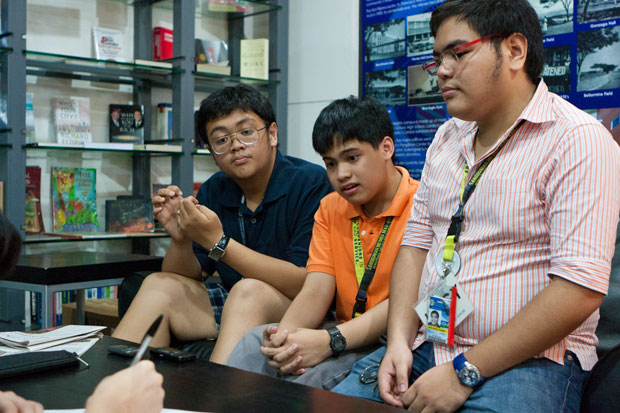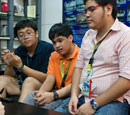
Ignite. Dan Remo, AJ Elicaño and Jiggy Villamin speak to The GUIDON about their new party. Photo by Abram P. Barrameda
Are you a national democrat, a social democrat, a democratic socialist or a liberal democrat?
These political labels—and the ideological convictions they represented—were central to the Ateneo narrative of the 1970s, a period when the protagonists of the story were college students who waged a resistance against the state’s fascist forces. These students’ modes of action had clear bases, since they subscribed to particular ideologies.
Fast-forward to the present, and there’s no doubt that it’s already a different narrative. Widespread political indifference had since taken the place of impassioned campus politics.
Indeed, any story about the present political scene on campus would seem dull when compared to the stories from the past decades—but the story of IBIG-Agila’s disbandment is interesting in its own way, and signals the start of something radically different (or something rather familiar, depending on the timeframe) for Ateneo student politics.
The beginning and end of IBIG-Agila
It was the year 2003, and no group with a political agenda was organized in the Loyola Schools. In an effort to revitalize student politics, Ramon Cualoping (AB Comm ’04) and Osmond Ong (BS CTM ’05) founded Partido Agila.
Roughly four years later, Partido Agila looked to be heading towards an irreversible decline. However, that was the time that former Sanggunian President Gio Tingson (AB Philo ’10) and former Sanggunian Vice President Jauro Castro (AB PoS ’10) founded Partido IsaBuhay-IsaGawa (IBIG). Partido IBIG later merged with the much older Partido Agila to form IBIG-Agila, which, at least on paper, was then supposed to be a social democratic party.
It was during the first semester of SY 2011-2012 that IBIG-Agila found itself confronting grave internal issues: questions regarding ideology, problematic internal procedures, and the structure of its executive board, among other concerns. In a previous interview with The GUIDON, Drex Oarde, then president of IBIG-Agila, said that the party would undergo restructuring in order to address these concerns.
However, early last November, most of the Sanggunian officers belonging to IBIG-Agila resigned from the party. The party’s dissolution was only inevitable after that.
The political arena
Gio Alejo, Sanggunian vice president and former IBIG-Agila chairperson, says that the gradual loss of ideological grounding was perhaps a product of history—while the party was initially advocating social democracy, it somehow got lost along in the way.
“Majority of the members do not even have the idea anymore of the principles of the party,” Alejo says. “I think it was the process or recruitment… We realized that the party was there for the name. It was being used… as a stepping stone for the Sanggunian.”
Ana Raymundo, School of Social Sciences chair and also formerly from IBIG-Agila, adds, “Maybe we weren’t able to concretize our ideology, or express it, or pass it to the next group of people. Throughout the years, it lost its way [and] meaning.”
Alejo and Raymundo’s words testify to the importance of ideology to a party. The Assembly, the political science student organization of the Ateneo, identified the lack of such in IBIG-Agila, and said in a statement following the party’s disbandment: “campus politics (as a microcosm of Philippine politics) had been characterized as being devoid of any genuine political substance, especially on the level of raising students’ capacity for critical thought with regard to issues that should be relevant to them.”
New characters
The disbandment, however, was an epiphany for some people.
“[It] was one good chance for us to really change things, to stop that notion to use IBIG-Agila to win but [to] really recreate a genuine party with members believing in what we stand for,” Raymundo says.
“We needed to change things and the problem was really in the [process of doing so],” Alejo says. According to him, there were those who wanted a completely new identity and there were those who wanted a rebranding of IBIG-Agila. “Siguro kailangan namin mag-internalize, and see if our beliefs and our ideologies are a different one,” Alejo says of what was going in their minds back then. In the end, the efforts to keep the party intact did not prevail.
Alejo and a few of his former colleagues in IBIG-Agila therefore formed a new party, the League of Atenean Youth for Liberal Advocacy (Loyola). While IBIG-Agila initially espoused social democracy, Loyola stands for social liberalism. “We stand for social justice, we stand for human rights, and we respect that people have their own different opinions,” Alejo says. Alejo is currently serving as Loyola’s chairman pro tempore.
Alejo says that they did not go with social democracy anymore, since he thinks it’s not practical to have two parties with the same ideology. “Why not join the other one (Crusada)? For me, social liberalism is another option students might see,” Alejo says.
Another faction of IBIG-Agila defectors took a different path and formed the Movement for Ignatian Initiative and Transformative Empowerment (Ignite). According to AJ Elicaño, junior School of Humanities central board representative, former IBIG-Agila member and Ignite’s interim vice president for strategy, his new party is about collaboration and “believes in access, empowerment, and transformation. The idea is that you give people access to skills-building, to resources, to information.”
Identity crisis
Christian Union for Socialist and Democratic Advancement (Crusada) Premier Miguel Rivera is suspicious of the two new parties. “Gio Alejo lied when he said that [IBIG-Agila] was the original social democratic party, and that Crusada [just] does it better, because when they disbanded, none of them formed a social democratic group,” he says.
“It seems like they woke up, searched Wikipedia for liberal democracy, and suddenly, that’s it—they’re liberal democrats,” Rivera says. According to him, ideologies do not function that way; political parties aren’t formed first, with the ideologies just coming later.
“I didn’t lie. [That was] a failure of the party,” Alejo responds. He explains that IBIG-Agila was initially social democratic even before he entered in 2009. If there was a shortcoming, he says, it is due to the lack of member training.
Alejo admits that they’re still a work in progress, and says that Loyola’s strategy is to establish itself in a slow pace so they could build a strong foundation. While Loyola members are not political science majors, they are reading up and are in the process of consultation with experts, in an effort to strengthen the party’s ideological position.
Meanwhile, Raymundo says that Ignite also doesn’t “want to be haphazard about it. We need to make sure that our people believe in what Ignite stands for.” Raymundo is currently serving as the president of Ignite.
“Don’t underestimate”
Rivera also questions Ignite’s seeming lack of understanding of what ideologies are. Ignite says that it will not impose issues on students, but for Rivera, that’s not how political parties should work. “An ideological program, by default, feels like an imposition… [Being ideological] is more discursive, more of a consciousness-driven state of mind,” Rivera says.
Raymundo counters by saying that it’s a matter of presenting the issues and letting the student body decide. “The point is: we allow [the students] to create informed choices. Let’s not underestimate Ateneans here,” she says.
Rivera insists, however, on seeing something from the two new political parties that are not just rewordings of their doomed predecessor’s ideas. He says that Loyola and Ignite should have real agenda.
“[Crusada’s] vision is [that] students should care about labor, and we push for the labor agenda,” Rivera says. “These are real agenda… [that] can be tied to social ills.”
For him, there are no real agenda in parties that become purely projects-based. “An agenda is a goal. If you ask, for example, what the goal of gathering the entire school during OrSem is, what they’d say is solidarity. [Then you ask them,] what is solidarity for? Then they collapse.”
Rising action
Amidst all these conflicting opinions and efforts, the narrative of campus politics carries on. For some people, the recent shakeup of the student political scene presents new opportunities. “The loss of the institution, while sad, allowed everyone else a chance to reflect,” Elicaño says.
Politics is never static because people will always disagree—this fact will always animate any political narrative. For sure, though, IBIG-Agila’s disbandment pushed the Ateneo community into a radically different story—and slowly but surely, an entirely new plot is emerging from the denouement.







